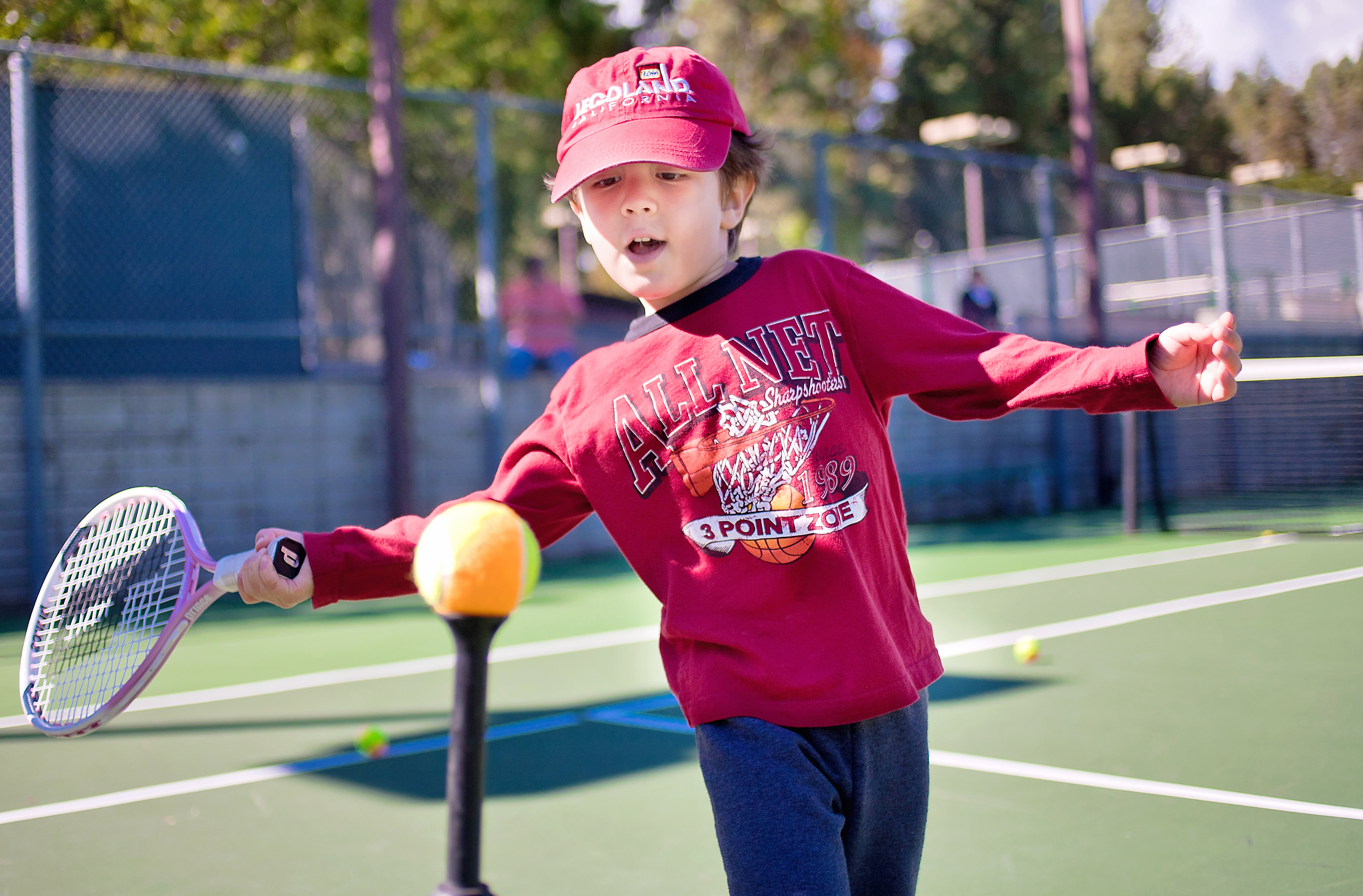Youths with autism take a swing at tennis

Diego Herrera, 4, participates in the UCLA Adaptive Tennis program, which partners with ACEing Autism to teach tennis to children with autism.
By Golmah Zarinkhou
Nov. 2, 2010 2:53 a.m.
Nischal Jeste Spurling, 3, stepped directly on his mark and gripped a tennis racket firmly in his little fist. He modeled for the children watching how to hit tennis balls exactly on cue from the instructor.
When 4-year-old Diego Herrera stepped up to a tee, he bounced distractedly on the balls of his feet and looked off into the distance, and a volunteer helped the child with autism hold the racket that was slipping through his grip.
He hit the ball, and it earned him a high five from Nischal.
“I like tennis,” Diego said softly in Spanish.
The difference between the two children’s approaches seemed vast, but it was nothing compared to when Diego first began playing the sport, said Harvey Rubin, a volunteer instructor and a member of the United States Professional Tennis Association.
In collaboration with the nonprofit group ACEing Autism, UCLA Recreation provides the L.A. community with Adaptive Tennis, a 10-week program designed for youths ages 4 to 18 with autism spectrum disorder.
“Any type of recreational activity has therapeutic value. (The children) work on social skills, gross motor and fine motor skills through playing tennis,” said Jamie Hoffman, adaptive recreation and aquatics program coordinator.
The idea sprouted two years ago when pediatric neurologist Shafali Jeste realized during her autism research in Boston that not enough play-based programs existed to address the social aspect of autism, said Richard Spurling, a tennis professional and Jeste’s husband.
Spurling and his wife combined their expertise to found ACEing Autism and its tennis program in Boston. After the couple moved to the West Coast and Jeste began her research at the UCLA Semel Institute for Neuroscience and Human Behavior, they reached out to begin the program this summer at UCLA.
Spurling sometimes brings their son Nischal, who does not have autism but learns tennis from his father, to motivate the children with autism.
In Boston, there were too few volunteers, but at UCLA, there are more than enough, Spurling said.
“It’s all volunteer-based. We do two fundraisers a year in Boston, and there’s just a small fee that helps us maintain the program,” he said. “The parents love it. The kids love it. It’s really rewarding from every angle.”
Vivian Lew, a UCLA statistics professor, said she nearly fell over when 5-year-old Jaakina Harris, her nonverbal autistic daughter, asked to play tennis during a walk in the park.
“The words were in her, and it just came out. Things like that happen when she is highly motivated,” Lew said.
Determined to find a suitable program, Lew said she could not find anything like Adaptive Tennis available in Southern California.
“I didn’t know that in my own workplace, they had a program like this for children. I was delighted,” she said.
Lisa Ding, a volunteer and second-year microbiology, immunology and molecular genetics student, said her favorite experience in the program was witnessing the change in Jaakina’s confidence and focus over the last few weeks.
“Tennis helps (children with autism) understand that life is this type of give and take,” Lew said.
Volunteer instructors Harvey Rubin and Stephen Bauer agreed that playing tennis has a significant and practical effect on the children.
“From the first day, the No. 1 thing these kids get is confidence,” said Bauer, a professional and celebrity tennis coach who taught the sport to Jenny McCarthy’s autistic son, Evan Asher, when he was 5. “Tennis can help you with everything in life.”
Even short games and drills can help the children understand the world outside sports in new ways.
Currently, ACEing Autism offers its tennis program in three locations ““ two in Boston and one in Los Angeles. Spurling said he hopes to expand the program nationally.
He added that he plans to meet with the board of directors to discuss broadening the reach of the nonprofit organization, and Hoffman said UCLA Recreation has similar goals.
“We hope to be able to serve more kids,” Hoffman said. “This is an incredible program that provides a typical experience to a child that faces challenges in the everyday environment.”


